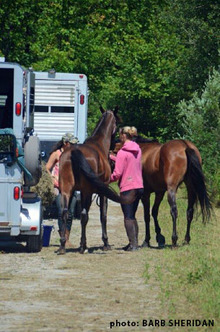Summer: the time of year equestrians of all disciplines travel cross country to their favorite show or trailhead. While we all try to drive as carefully as possible, sometimes just driving safely wonât be enough for you and your precious cargo. USRider takes a look at a few tips, should a life threatening accident occur.

Know what to do in case of a horse trailer accident
Knowing that you may have a trailer full of injured horses is enough to spike your adrenaline, but staying calm will benefit you and your horses, because there is nothing more you can do but deal with the situation in a calm manner.
© 2015 by Barbara Sheridan
Itâs a moment all horse owners fear. You look back and see your trailer tipping to one side or doing a jack-knife maneuver. While there is no point in stopping in a spot that may cause you more danger; if possible, immediately slow down, turn on your hazard lights and find a deep shoulder to pull over.
While everything seems to be happening very fast, it is important to stay calm. Knowing that you may have a trailer full of injured horses is enough to spike your adrenaline. Staying calm will benefit you and your horses, because in retrospect, it happened; there is nothing more you can do but deal with the situation in a calm manner.
If you find yourself with an overturned trailer, your first move is to call 911. Your second move is to assess your situation. Approach your trailer slowly and speak in a low voice. Running up to your trailer will only increase the stress for your horse(s).
Horses are known to try to fit through spaces that are too small. Do not try to open a door or window. Evaluate your situation: Is he tied to the trailer? Is there another horse on top of him? Is the divider puncturing him? CAUTION: Do not attempt to remove the horse from the trailer until professional help arrives.
Other assessments should be made. If there is a fire in or near your trailer, your horseâs first instinct is to run. Horses are prey animals. So when they are trapped lying down in a trailer with fire near, it sets up a traumatic scene.
Best move for fire? If you have something that will blindfold your horse, it will ease his stress level. It will also be easier for first responders to get your horse(s) out of the trailer with less thrashing. If horses are able to get up, they will make it happen! They may lie still for a few minutes from exhaustion, but eventually put up a fight to get out. Horses can go into shock which can sometimes lead to death.
Do not climb into the trailer in an attempt to free them. Better yet, do not stick your arm or leg into the trailer as youâre asking for a broken limb.
If your horse is tied to the trailer, either pull on the quick-release latch (with one hand holding the horseâs halter) or use a curved knife on a long pole to cut the trailer tie. A long pole should be used, so you are not standing close to the trailer in case the horse fights and you end up getting stabbed. Horses are incredibly capable of handling and surviving traumatic trailer accidents. Enter the importance of leg and body protection.
If you are traveling on a long trip, make sure to use wraps and then place shipping boots over them. Make sure the boots extend over the knees and hocks. There are companies that produce helmets and tail wraps for the not-so-patient horse. Also consider a sheet to protect the entire body.
About USRider
USRider â in its 14th year of operation â is the only company to provide emergency roadside assistance for horse owners. Through the Equestrian Motor Plan, USRider provides nationwide roadside assistance and towing services along with other travel-related benefits to its Members.
The plan includes standard features such as flat-tire repair, battery assistance, lockout services, and roadside repairs for tow vehicles and trailers with horses, plus towing up to 100 miles. As an additional service, USRider maintains a national database that includes emergency stabling, veterinary and farrier referrals.
For more information about the USRider Equestrian Motor Plan, visit www.usrider.org online or call 800-844-1409. For additional safety and travel tips, visit the Equine Travel Safety Area on the USRider website at www.usrider.org.
